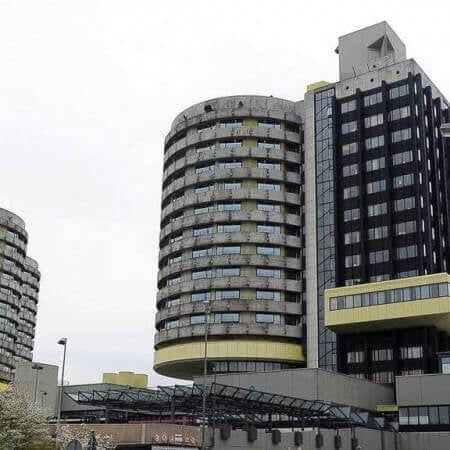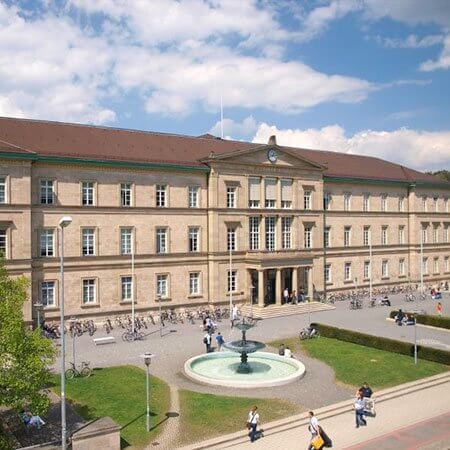A facial nerve neuroma leads to chronic pain, facial muscle weakness, and hearing loss. The tumor grows slowly, but after a few years, it can reach a large size, compress the tissue and cause complications. In Germany, the disease can be successfully cured. Doctors use microsurgical operations and radiosurgery. These treatment methods help not only to stop the progression of symptoms but also to restore facial nerve function. It also helps to get rid of the complications associated with the pressure of the neuroma on the surrounding tissues.
Content
- What is a facial nerve neuroma?
- How is a facial nerve neuroma treated?
- Why is it better to undergo your treatment of facial nerve neuroma in Germany?
Small neuromas can be monitored with an annual CT or MRI scan. Should any symptoms manifest themselves, the tumor size will be reduced using stereotactic radiosurgery. Patients with large tumors, severe paresis, and complications undergo microsurgical resection of the tumor while preserving or restoring the facial nerve function whenever possible.
You can undergo your treatment in one of the following hospitals: University Hospital Muenster, Charite University Hospital Berlin, or University Hospital Frankfurt am Main.
You do not have to deal with the organization of your treatment abroad on your own, as the Booking Health specialists can take care of these concerns. They will select a clinic and a doctor for you, make an appointment for a preferred date, help you to get a visa, provide medical insurance, book airline tickets and apartments, provide interpreting services and take care of every stage of your treatment.
What is a facial nerve neuroma?
A facial nerve neuroma (schwannoma) is a neuroectodermal tumor, which is usually benign and enclosed within a capsule. This neoplasm consists of Schwann cells located in the peripheral nerve sheaths.
The tumor can develop in any part of the facial nerve, but in 90% of cases, it appears inside the skull. Such neoplasms are called intracranial. Only 10% of tumors are extracranial; that is, they grow from the peripheral part of the facial nerve (the tumor passes through the thickness of the parotid salivary gland).
Features of facial nerve schwannomas are as follows:
- they grow very slowly, 1-2 mm per year;
- they do not cause any symptoms for years;
- they do not invade the surrounding tissues, as they are enclosed within a capsule.
Upon reaching a large size, a schwannoma compresses the surrounding tissues, causing pain, facial muscle weakness, dryness of the eye on the side of the lesion, and hearing impairment.
How is a facial nerve neuroma treated?
The main options for managing patients with facial nerve neuromas are as follows:
- medical supervision and conservative treatment aimed at relieving symptoms;
- nerve decompression surgery;
- stereotactic radiosurgery (for example, treatment with a Gamma Knife or a CyberKnife);
- microsurgical resection of the tumor.
Doctors avoid surgery if the tumor is small and if there is a slight dysfunction of the mimic muscles (grades I-II according to the House-Brackmann scale). Surgical treatment will be switched to in grades III-IV paresis, a rapid tumor growth, the threat of complications, brainstem compression, or labyrinth erosion.
Surgical treatment does not always lead to restoring the facial nerve function. The chances of getting a good functional outcome are higher if the operation is performed within 12 months after the manifestation of signs of paresis.
Doctors in Germany seek not only to remove the tumor but also to restore the facial nerve function. Schwannomas grow from a nerve sheath. This sheath can both compress the nerve and penetrate it. Should the integrity of the nerve be broken, then the tumor will be removed together with its fragment. The ends will then be brought together and sutured to restore the possibility of conducting impulses along the facial nerve. Sometimes the removed portion is too large, making it impossible to bring the ends together. In such situations, German neurosurgeons resort to transplanting a fragment of the great auricular or sural nerve.
Doctors in many German hospitals resort to stereotactic radiosurgery, which is a safer alternative to a classical operation. Since this type of treatment rarely leads to any complications, radiosurgery is resorted to even at an early stage of the disease, with grade II paresis. As a result of the procedure, pressure on the facial nerve and surrounding tissues is eliminated by reducing the tumor size, so the nerve function is restored. Nonetheless, radiosurgery is not suitable for patients with large tumors and complications.
Why is it better to undergo your treatment of facial nerve neuroma in Germany?
You can opt for your treatment of facial nerve neuroma in Germany to get the best functional outcomes and avoid complications. There are a few reasons for you to undergo your treatment in this country:
- experienced neurosurgeons will perform the operation safely, avoiding any damage to the facial nerve and other functionally essential structures;
- full preoperative diagnostics using CT, MRI, and functional methods provides an opportunity to plan the operation optimally;
- neuromonitoring systems for minimizing the risk of complications;
- doctors suture the nerve or restore it with an allograft to avoid a neurological deficit;
- provision of the maximum possible rehabilitation of auditory function and mimic muscle mobility;
- safer radiosurgery can be used instead of surgical interventions, which works well for stage II-III mimic muscle paresis.
You can make your treatment appointment in Germany through the Booking Health service. The Booking Health specialists will help you to choose the most suitable clinics in Germany and organize your trip. Our website presents the best medical centers where you can undergo an operation or have your tumor destroyed with radiosurgical methods. Our website also offers the cost of medical programs in different hospitals. You can compare prices to book your treatment at the best price.
Authors:
The article was edited by medical experts, board certified doctors Dr. Nadezhda Ivanisova and Dr. Sergey Pashchenko. For the treatment of the conditions referred to in the article, you must consult a doctor; the information in the article is not intended for self-medication!
Sources:
MedlinePlus
Verywell Health


















